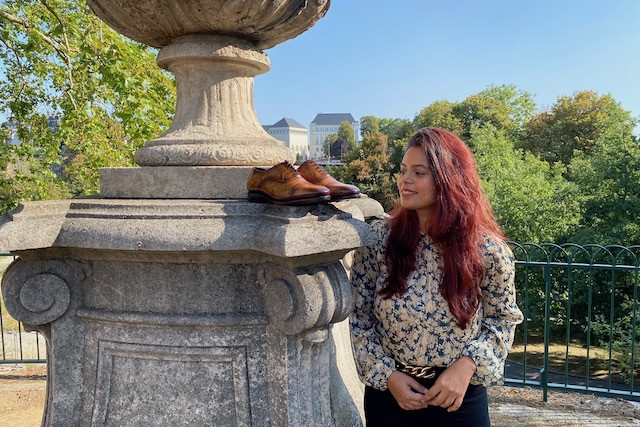The brand Moajaza, taken from the Arabic word for “miracle”, isn’t just that: its creation was years in the making for founder Anushka Prakash.
Originally from the eastern Indian state of Bihar, Prakash moved to Luxembourg end-2016, having studied commerce in New Delhi and Calcutta. After three years in an accountancy role in India, she was already convinced: “It was not what I wanted to do.”
When she and her husband arrived in the grand duchy, the two discussed her potential career prospects given her background and she began the standard career search. But her idea to open her own shoe brand was already firmly rooted. “But I first had to convince my husband,” she says. She set out to do just that.
Intrigued by patina
Anushka Prakash earliest interest in footwear is thanks to her father. “My father loved shoes and told me that to understand someone’s personality, you have to look at their shoes,” she says. (In case you’re wondering, Prakash’s personal preference is flat, comfortable kicks.)
She has fond memories of shoe shopping with her father, adding he had no qualms about “spending a little extra” to ensure good quality, and taught her how to take good care of them so they lasted longer.
Prakash’s mother, who had an interest in fashion design, also inspired her. By Prakash’s teen years, she was purchasing simple canvas sneakers, using fabric paint, studs and design elements to embellish them, which she then sported at parties and the like.
One of her first projects to convince her husband, an initial investor, to start her footwear line was her taking one of his broken in pair of shoes, which she redesigned with a funky graphic pattern. She knew the commerce side from her studies, but she realised she would need to learn more about the technique of shoemaking, and for her there was no other place for that than Italy.
That's why in 2018-19, she attended the Istituto Marangoni in Florence, Italy, where she learned more about each part of the shoe, from soles to heels and each part in between, as well as the process of the craft. She also used the time to discuss her business plan with professors and fellow students so that she already had a network in place when she launched her business. The school also offered opportunities to tour manufacturing sites, and Prakash additionally spent a stint working at Idee Partners, where she witnessed the full creation of shoes made by hand: from design to cutting, leather work, stitching, ironing and more. “There were over 70 steps, and they were making five to ten pairs each day, all by hand,” she says.
The art of patina, which adds a worn-down, vintage sheen to a surface through a tarnish, was of particular interest to her. “I fell in love with the concept,” she explains, adding that she had never seen such a technique in India. Once back in Luxembourg, she visited the House of Entrepreneurship to attend seminars and finalise her business paperwork and, by end-2019, her business was born.

The cognac “Vito” shoe incorporates hand-painted calf leather and the patina technique Photo: Moajaza
Sharing culture through footwear
She tested her first designs on friends, initially making 10 pairs, all of which sold. Now she works with a Spanish manufacturer to produce the shoes which she designs from her Luxembourg base, but for her next collection she hopes to incorporate Indian embroidery into her footwear (she has already experimented, for example, with elements of Hindu calligraphy in her designs). In February, she was visiting India for personal reasons--and then, thanks to covid-19, she had to remain there for four months. “I worried if I was meant to be doing this,” she admits, although she’s now in positive spirits and actively seeking avenues to get her unisex shoes in shops in Luxembourg and the greater region.
Prakash sees her footwear as a way to celebrate the various cultures which have influenced her, and she dreams of the day when her collection will make it on the runway.
In her five-year plan, she would love to own her own shoe store, but for now she is happy to invite clients into her Luxembourg City home so they can try on the shoes themselves and she can adapt the fitting as necessary. Customised versions can be ready within two to three weeks. Her shoes start at €250 for women, €350 for men, but the quality of the stitching, traction details on the sole grip make it evident these are sturdy shoes. In the pair pictured above, for example, an extra layer of cork has been added between the soles and base for an extra layer of comfort.
Prakash is also looking into an application with her Spanish manufacturer, which would allow individuals to upload an image of their foot so shoes can be custom made with considerations like arch heights and foot width in mind. Her father’s lessons seem to resonate still. As Prakash puts it, “It’s all about quality and comfort.”
